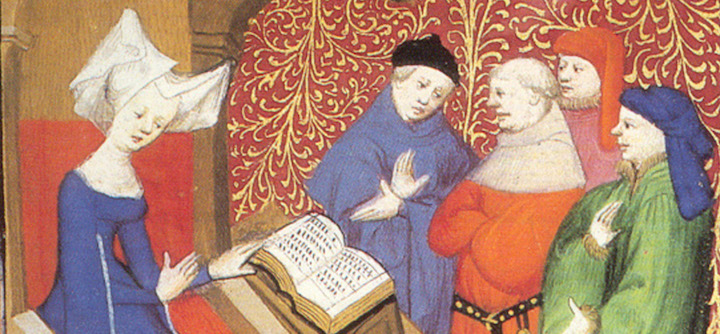Press for Progress: Feminism and Medieval Studies – 28th March 2018

The Medieval Women, Modern Readers Wikipedia Edit-A-Thon was set up to improve references to scholarly work by women and non-binary people in articles related to medieval studies, and to create and improve pages for women and non-binary medieval scholars and artists who study and/or remake medieval texts, objects, or themes.
We had 14 participants – 10 of whom were new to editing Wikipedia – including the founders of the Women’s Classical Committee Wikipedia group; students and staff from KCL, QMUL, Sussex University and Glasgow University; and two members of the DamesNet network. We were also joined by two representatives from Wikimedia.
On the day, we edited 21 articles and created two new articles. Our MedievalWiki project page documents our progress, lists articles that need improvement, and lists notable scholars who need pages made. We will continue maintaining this page; anyone can make suggestions for further improvements and record their own editing progress.
The Press for Progress: Feminism + Medieval Studies Roundtable was organised in response to the ‘Press for Progress’ theme of International Women’s Day, which seemed an apt starting point to reflect on feminist scholarship within medieval studies; 2018 anticipates several conferences and journal special issues which seek to ‘reevaluate’ the place of feminism in medieval studies. The roundtable offered an opportunity to reflect on progress already made, and possible future strategic directions, within our discipline.
46 people attended, comprising members of the public and staff and students from universities across the country, including a few visiting scholars from Europe and the USA. We enjoyed quite a buzz on social media, too, suggesting that there is a real appetite for events that bring together a wide range of scholars and offer the space for open, productive, feminist discussion.
Our panellists were: Helen Brookman (King’s College London); Hetta Howes (City University); Clare Lees (KCL); Roberta Magnani (Swansea University); Liz Herbert McAvoy (Swansea University); Jennifer Neville (Royal Holloway); Elizabeth Robertson (University of Glasgow); and Diane Watt (University of Surrey). Alicia Spencer-Hall (QMUL) chaired.
We gave our panellists a deliberately broad brief so that they might respond with a variety of ideas and provocations, which included: the reception histories of nineteenth-century women medievalists and Anglo-Saxon archaeology; ‘everyday feminisms’, feminist co-teaching and feminist theory in the classroom; the ‘Middle’-ness of medieval studies; and the responsibilities of senior feminists within higher education. Together, alongside comments from the audience, our speakers articulated the urgent need to continue working to change lazy narratives of the past, to make scholarship more accessible, and to communicate more often and more productively.
The benefits of this event for us as postgraduate researchers and aspiring academics cannot be overstated. Beyond the skills we have developed in event organisation – from budgeting to communications and marketing – the opportunity to share ideas with a community of committed feminist medievalists at all stages of their careers and from a range of institutional backgrounds will be invaluable for our own professional development. This range of different voices was vital to the spirit of the event, and without the support of LAHP, we would not have been able to host such an impressive line-up of scholars from across the UK.
We are proud that the event has made a wider contribution to the field, too; comments from participants and panellists suggest that the day’s activities generated a deep and affirming sense of feminist community spirit. We are committed to nurturing this community and continuing the crucial conversations that began at the roundtable and so, in addition to maintaining the Wikipedia project, we are in discussions about setting up a medieval feminist reading group in London as a way of building on the energy that has already been generated.

